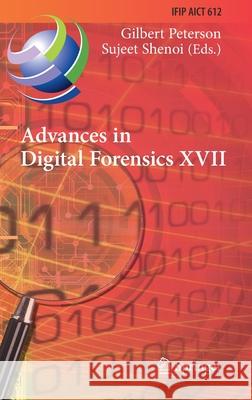Advances in Digital Forensics XVII: 17th Ifip Wg 11.9 International Conference, Virtual Event, February 1-2, 2021, Revised Selected Papers » książka
Advances in Digital Forensics XVII: 17th Ifip Wg 11.9 International Conference, Virtual Event, February 1-2, 2021, Revised Selected Papers
ISBN-13: 9783030883805 / Angielski / Twarda / 2021 / 284 str.
Advances in Digital Forensics XVII: 17th Ifip Wg 11.9 International Conference, Virtual Event, February 1-2, 2021, Revised Selected Papers
ISBN-13: 9783030883805 / Angielski / Twarda / 2021 / 284 str.
(netto: 498,38 VAT: 5%)
Najniższa cena z 30 dni: 501,19
ok. 22 dni roboczych.
Darmowa dostawa!
Digital forensics deals with the acquisition, preservation, examination, analysis and presentation of electronic evidence. Computer networks, cloud computing, smartphones, embedded devices and the Internet of Things have expanded the role of digital forensics beyond traditional computer crime investigations. Practically every crime now involves some aspect of digital evidence; digital forensics provides the techniques and tools to articulate this evidence in legal proceedings. Digital forensics also has myriad intelligence applications; furthermore, it has a vital role in cyber security -- investigations of security breaches yield valuable information that can be used to design more secure and resilient systems.Advances in Digital Forensics XVII describes original research results and innovative applications in the discipline of digital forensics. In addition, it highlights some of the major technical and legal issues related to digital evidence and electronic crime investigations. The areas of coverage include: themes and issues, forensic techniques, filesystem forensics, cloud forensics, social media forensics, multimedia forensics, and novel applications.This book is the seventeenth volume in the annual series produced by the International Federation for Information Processing (IFIP) Working Group 11.9 on Digital Forensics, an international community of scientists, engineers and practitioners dedicated to advancing the state of the art of research and practice in digital forensics. The book contains a selection of thirteen edited papers from the Seventeenth Annual IFIP WG 11.9 International Conference on Digital Forensics, held virtually in the winter of 2021. Advances in Digital Forensics XVII is an important resource for researchers, faculty members and graduate students, as well as for practitioners and individuals engaged in research and development efforts for the law enforcement and intelligence communities.











